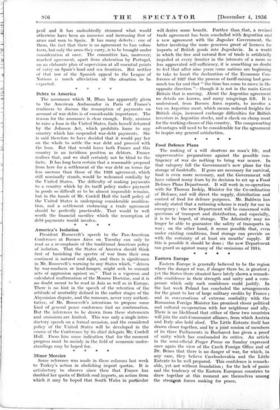Debts to America The assurance which M. Blum has apparently
given to the American Ambassador in Paris of France's readiness to discuss the resumption of payments on account of war debts is of considerable importance. The reason for the assurance is clear enough. Italy, anxious to raise a loan in the United States, finds herself debarred by the Johnson Act, which prohibits loans to any country which has suspended war-debt payments. She is said therefore to have decided that it would pay her on the whole to settle the war debt and proceed with the loan. But that would leave both France and this country in an invidious position as debtors. France realises that, and we shall certainly not be blind to the facts. It has long been certain that a reasonable proposal from here for a settlement of the war debt on terms far less onerous than those of the 1923 agreement, which still nominally stands, would be welcomed cordially by the United States. The difficulty of making payments to a country which by its tariff policy makes payment in goods so difficult as to be almost impossible remains, but in the hands of Mr. Cordell Hull the tariff policy of the United States is undergoing considerable modifica- tion, and a settlement embracing a trade agreement should be perfectly practicable. That would be well worth the financial sacrifice which the resumption of debt-payments would involve.




















































 Previous page
Previous page